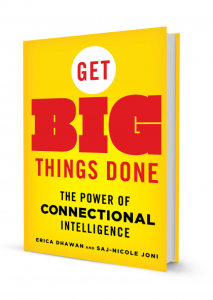 A lot of how we measure success in the digital world is about quantity. How many Facebook likes does my company have? How many retweets did we get? For the small business owner or aspiring entrepreneur, I believe the metric needs to shift from quantity to quality. Building relationships that lead to meaningful impact and business growth involves making the smart connection, getting the right people together, collecting the important data and using resources in the smartest way, not just attracting the most clicks. Simply building a network doesn’t lead to measurable change. The key is how you use that network by developing connectional intelligence.
A lot of how we measure success in the digital world is about quantity. How many Facebook likes does my company have? How many retweets did we get? For the small business owner or aspiring entrepreneur, I believe the metric needs to shift from quantity to quality. Building relationships that lead to meaningful impact and business growth involves making the smart connection, getting the right people together, collecting the important data and using resources in the smartest way, not just attracting the most clicks. Simply building a network doesn’t lead to measurable change. The key is how you use that network by developing connectional intelligence.
In our book Get Big Things Done my co-author Saj-nicole Joni and I define connectional intelligence as the ability to combine knowledge, ambition and human capital, forging connections on a global scale that create unprecedented value and meaning. It is the skill that 21st century entrepreneurs are using to maximize their networks and drive breakthrough results, and it is something we can all develop.
Here are four ways to build your connectional intelligence:
1. Spend fifteen minutes each day opening yourself up to new people and ideas. Before you even start building relationships, give yourself a healthy dose of consciousness-expanding. This means connecting with people of different cultures, different backgrounds, and in different industries. Connectional intelligence is all about bridging generations and bridging skill sets. We all have something to teach each other, and the idea that might revolutionize your company’s normal way of operating is probably not going to come from someone who has exactly the same lifestyle as you.
2. Partner with people who have common interests and missions, but different skills. Starting a business requires the purposeful combination of many different areas of expertise, and one person can’t possibly possess them all. As a lone entrepreneur, you definitely don’t have everything you need. Think about where your strengths are and make sure to have people around you that complement them. Having twenty-five big idea people in a room won’t get your business off the ground, even if they are all passionately committed to your vision. You only need five quality supporters with diverse skills to actually turn that passion into execution. When you surround yourself with people who challenge you, you can find wisdom in the exchange of ideas and fight your way to breakthroughs.
3. Leverage what you already know. Ask yourself: What do I already know that connects me to something different from what I know? Take the story of CrowdMed, an online platform which harnesses the wisdom of crowds to help solve the world’s most difficult medical cases, founded by Jared Heyman. Before starting CrowdMed, Heyman worked for 15 years in the Internet technology industry. When faced with his little sister’s medical crisis, he took the skills he had from working at an online survey company and applied them to create a radically new platform for the diagnosis of rare diseases. It was his ability to take his skills and apply them in a different field that led to the creation of something with such huge impact like CrowdMed, diagnosing hundreds of medical cases that doctors weren’t able to solve.
4. Broaden the possibilities of who you might serve. When looking to start or grow your business, think bigger about who your customer base is. Often your product or service can help more constituencies than you might imagine. For example, Aheda Zanetti is an entrepreneur from Australia who designed a swimsuit for Muslim women called the burqini. Today, a huge percentage of Zanetti’s customer base are non-Muslim women who want to be fully covered for different reasons. As Zanetti exemplifies, if you stick rigidly to your original business plan or vision, you will greatly limit your business’s potential.
Entrepreneurship requires hustling, but the truly successful businesses develop meaningful relationships through authentic connection. Building the fuel needed to push past challenges and bring something creative and new to the world takes time but it will lead to longevity. The most important thing is to really listen, all along the way, for new opportunities to connect in new ways, making sure that the work you are doing continues to deliver something that people actually want.

